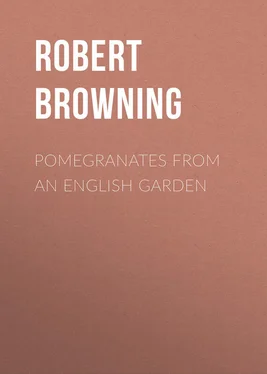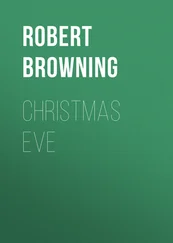Robert Browning - Pomegranates from an English Garden
Здесь есть возможность читать онлайн «Robert Browning - Pomegranates from an English Garden» — ознакомительный отрывок электронной книги совершенно бесплатно, а после прочтения отрывка купить полную версию. В некоторых случаях можно слушать аудио, скачать через торрент в формате fb2 и присутствует краткое содержание. Жанр: foreign_antique, foreign_prose, на английском языке. Описание произведения, (предисловие) а так же отзывы посетителей доступны на портале библиотеки ЛибКат.
- Название:Pomegranates from an English Garden
- Автор:
- Жанр:
- Год:неизвестен
- ISBN:нет данных
- Рейтинг книги:5 / 5. Голосов: 1
-
Избранное:Добавить в избранное
- Отзывы:
-
Ваша оценка:
- 100
- 1
- 2
- 3
- 4
- 5
Pomegranates from an English Garden: краткое содержание, описание и аннотация
Предлагаем к чтению аннотацию, описание, краткое содержание или предисловие (зависит от того, что написал сам автор книги «Pomegranates from an English Garden»). Если вы не нашли необходимую информацию о книге — напишите в комментариях, мы постараемся отыскать её.
Pomegranates from an English Garden — читать онлайн ознакомительный отрывок
Ниже представлен текст книги, разбитый по страницам. Система сохранения места последней прочитанной страницы, позволяет с удобством читать онлайн бесплатно книгу «Pomegranates from an English Garden», без необходимости каждый раз заново искать на чём Вы остановились. Поставьте закладку, и сможете в любой момент перейти на страницу, на которой закончили чтение.
Интервал:
Закладка:
Robert Browning
Pomegranates from an English Garden / A selection from the poems of Robert Browning
INTRODUCTORY
The name of Robert Browning has been before the world now for fifty years. For the greater part of the time his work has had so little recognition, that one marvels at his courage in going so steadily on with it. His “Pomegranates” have been produced year after year, decade after decade, in unfailing abundance; and, while critics have kept paring at the rind, and the general public has not even asked if there was anything beneath it, he has laboured on with unremitting energy, calmly awaiting the time when “the heart within, blood-tinctured, of a veined humanity,” should be at length discovered. It can scarcely be said, even yet, that that time has come; but it is coming fast. Already he is something more than “the poet’s poet.” Few intelligent people now are content to know one of the master minds of the age simply as the author of “The Pied Piper of Hamelin,” as if that were the only thing he had written worth reading!
That the form in which the thought of Browning is cast is altogether admirable, is what none but his most undiscriminating admirers will assert. It is often, unquestionably, rough and forbidding. But there is strength even in its ruggedness; and in its entire freedom from conventionality there is a charm such as one enjoys in wild mountain scenery, even though only in little patches it may have any suggestion of the garden or the lawn. There are those who have charged the poet with affectation of the uncouth and the bizarre; but careful reading will, we think, render it apparent that it is rather his utter freedom from affectation which determines and perpetuates the peculiarities and oddities of his style; that, in fact, the aphorism of Buffon, “ le style est l’homme même ,” is undoubtedly true as applied to him. It would, of course, be absurd to claim for the pomegranate the bloom and beauty of the peach; but, equally with the other, it is Nature’s gift, and to toss aside a rough-rinded fruit because it needs to be “cut deep down the middle” before its pulp and juices can be reached, is surely far from wise. Even hard nuts are not to be despised, if the kernels are good; and as to Browning’s “nuts,” we have this to say, that not only are they well worth cracking, but there is in the process excellent exercise for the teeth.
This brings us to the alleged “obscurity” of Browning’s writings, which still continues to be the main obstacle to their general appreciation. It is freely admitted that often it is not quite easy, and sometimes very difficult, to understand him; and it is hard for most people to see why he could not make his meaning plainer, and matter for regret to many, who heartily admire him, that he has not done so. That he has taken some pains to this end is evident from what he says in the preface to “Sordello,” written for an edition issued in 1863, twenty-three years after its original publication: “My own faults of expression were many… I blame nobody, least of all myself, who did my best then and since, for I lately gave time and pains to turn my work into what the many might – instead of what the few must – like.” In a later preface (1872) he says, “Nor do I apprehend any more charges of being wilfully obscure, unconscientiously careless, or perversely harsh.” The true explanation of it seems to be what we have already suggested, that he does not think of his audience as he writes, his only care being to express the thought in the way which comes most natural to him. As a dramatist, he can throw himself with abandonment into the persons he represents; but he never seems to think of putting himself in the position of a listener, or, if he does, he assumes too readily that he has a mind of similar texture and grasp to his own. On the other hand, it is fair to say that the difficulty of understanding him arises in great part from the very excellence of his work. The following considerations will illustrate what we mean: —
1. His work is full of thought , and the thought is never commonplace. There is so much of it, and all is so fresh, and therefore unfamiliar, that some mental effort is necessary to grasp it. The following characteristic remark of Bishop Butler, in his preface to the famous Fifteen Sermons, is worth consideration in this connection: “It must be acknowledged that some of the following Discourses are very abstruse and difficult; or, if you please, obscure; but I must take leave to add that those alone are judges, whether or no and how far this is a fault, who are judges, whether or no and how far it might have been avoided – those only who will be at the trouble to understand what is here said, and to see how far the things here insisted upon, and not other things, might have been put in a plainer manner; which yet I am very far from asserting that they could not.”
2. The expression is always the briefest. Not only are no words wasted, but, where connecting ideas are easily supplied, they are often left unexpressed, the intelligence and mental activity of the reader being always taken for granted.
3. The poems are, for the most part, dramatic in principle. The reader is brought face to face with some soul, in its thoughts and emotions, frequently in the very process of the thinking and the feeling. The poet has stepped aside, and of course supplies no key. The author does not appear, like the chorus in a Greek play, to point a moral or explain the situation. The dramatis personæ must explain themselves. And, just as Shakespeare must be studied in order to an appreciation other than second-hand, so must Browning be studied in order to be appreciated at all; for his writings are not yet old enough to secure much second-hand enthusiasm.
4. The wealth of allusion is another source of difficulty. The learning of our poet is encyclopædic; and though there is no display of it, there is large use of it; and it often happens that passages or phrases, which seem crabbed or obscure, require only the knowledge of some unfamiliar fact in science or in history, or it may be something not readily thought of, and yet within easy range of a keen enough observation, to light them up and reveal unsuspected strength or beauty.
Before leaving the subject of the rough and often tough exterior of Browning’s work, it may be interesting to refer to the characteristic illustration of it he has lately given us in the prologue to “Ferishtah’s Fancies,” his most recent work. He begins by asking the reader whether he has ever “eaten ortolans in Italy,” and then goes on to describe the preparation of them. The following lines will show the use he makes of the illustration:
“First comes plain bread, crisp, brown, a toasted square;
Then, a strong sage-leaf;
(So we find books with flowers dried here and there
Lest leaf engage leaf.)
First, food – then, piquancy – and last of all
Follows the thirdling;
Through wholesome hard, sharp soft, your tooth must bite
Ere reach the birdling.
Now, were there only crust to crunch, you’d wince:
Unpalatable!
Sage-leaf is bitter-pungent – so’s a quince;
Eat each who’s able!
But through all three bite boldly – lo, the gust!
Flavour – no fixture —
Flies permeating flesh and leaf and crust
In fine admixture.
So with your meal, my poem; masticate
Sense, sight and song there!
Digest these, and I praise your peptics’ state,
Nothing found wrong there.”
This extract also furnishes an example of the strange rhymes in which the poet sometimes indulges, with what appears too little refinement of taste.
The themes of Browning’s poetry are the very greatest that can engage the thought of man. He ranges over a vast variety of topic; but, wherever his thought may lead him, he never loses sight of that which is to him the centre of all, the human soul, with its infinite wants and capabilities. In the preface to “Sordello” he says: “The historical decoration was purposely of no more importance than a background requires; and my stress lay on the incidents in the development of a soul: little else is worth study. I, at least, always thought so.” To this principle he has kept true through all his work; and hence it is that, whether the particular subject be love, or home, or country; poetry, painting, or music; life, death, or immortality; it is dealt with in its relation to “the development of a soul.” Hence it is that his poetry is so thoroughly and profoundly spiritual, and so exceedingly valuable as a counteractive to the materialism of the age, which ever tends to merge the soul in the body, and swallow up the real in mere phenomena.
Читать дальшеИнтервал:
Закладка:
Похожие книги на «Pomegranates from an English Garden»
Представляем Вашему вниманию похожие книги на «Pomegranates from an English Garden» списком для выбора. Мы отобрали схожую по названию и смыслу литературу в надежде предоставить читателям больше вариантов отыскать новые, интересные, ещё непрочитанные произведения.
Обсуждение, отзывы о книге «Pomegranates from an English Garden» и просто собственные мнения читателей. Оставьте ваши комментарии, напишите, что Вы думаете о произведении, его смысле или главных героях. Укажите что конкретно понравилось, а что нет, и почему Вы так считаете.












